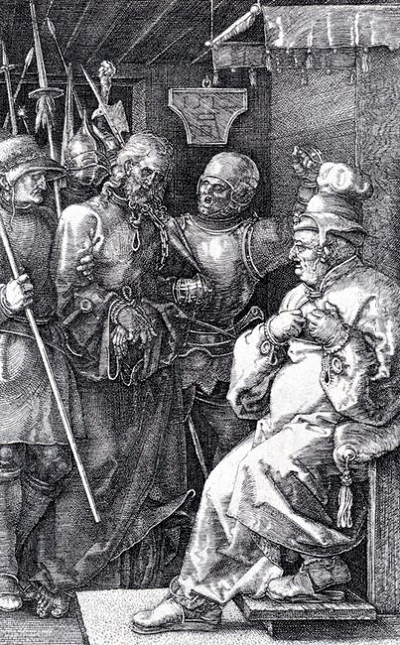Caiaphas
Joseph ben Caiaphas known simply as Caiaphas (Matthew 26/57-67, 27/1-2, Mark 14/63-65, 15/1, Luke 22/66-71) did not bring anything original in the world. He continually comes to life again; among all the devastating people in society he is the one that convicts ; he will not disappear as long as the world fails to change (Rev of Arès 28/7).
-
Caiaphas questioned Jesus saying, "Are you the Christ, the Blessed One's son?" Jesus replied, "I am and you will see the Son of Man seated at the right hand of the Power and coming with the clouds of Heaven." At that Caiaphas tore his garments and cried out, "What further need do we have of witnesses? You have heard the blasphemy!" They all condemned him as deserving to die (Mark 14/61-64).
Those condamners were sincere, and therein lay the dramatic antilogy. As Jews and gardians of heir religion they had long understood that Jesus was going to unfetter it, make faith free provided it would be lived through the Sermon on the Mount (Matthew ch. 5 to 7). We Arès Pilgrims too have Caiaphases, whom penitence constains us to love, forgive, let free to act (Rev of Arès 10/10) until the dawn (xxxv/7) of the Day appears when we will make them find out that love is intelligence (32/5) and that law is just never-ending complacent endless vengeance (27/9).
____________________________________

Jesus dragged to
Caiaphas
by Albrecht Dürer
Our mission urges the world to move from
religious dogmata, or rationalistic, philosophic, scientific law,
or general incredulity, or together triliterally, to love,
so that we have a huge triplice of detractors, many of them
incline to make us disappear. There is only a very small trace of
unblinking mankind, whom we can persuade to follow us: the
ripe wheat ears.
In public debates two sorts of speech always conflict with each
other, that of accusers and that of defendants. Defendants
are always minority. The accusers have got the widespread majority
"reason" of the law of rats (Rev of Arès xix/24) and
they never run short of arguments. So Justice is inevitably
sluggish.
How long lasted Adam's sacred Fire before he
put on sin (Rev of Arès 2/1-5, vii/6-13) as a
candle-snuffer hat and got out of Éden ? Nobody knows, because the
ancient biblicists only wrote summaries. The Bible as a whole,
however, drives us to guess that Adam was a thinking
animal again and his life expectancy drew in and became as short
as his lifetime before his spiritual creation, but was given
possibility of being redeemed. Ipso facto, the Creation or
Spiritualization of man has resumed, although slowly and
interspersedly, on the momentum of the initial Power.
The improvement of biological life is slow to the point of being
unseen, because biological life has turned too short and humans
—with a few exceptions—cannot experience it. Improvement
nevertheless has been having an impact on all areas of society
ever for millenia, because man, although resistant to the Maker's
Design, is the only living being on earth who has never
stopped observing himself, being amazed at himself, questioning
himself about his future, because he has so far remained his own
co-creator unknowingly (Genesis 1/26-27). With a very
lazy crawling every micro-aspect of the way man little by little
has found (Rev of Arès 24/5) all that ancestor Adam
had denied to be.

Archeological
remains of Khaybar (Arabia). Men used to live there
millennia ago, but what fundamental difference with us ?
None.
The innocent always struggle to survive their judges.
A short while ago I was pondering over a few
pictures of the archæological remains of Khaybar in Arabia :
human beings used to live there millenia ago and I was thinking of
the time people need to come back from Adam's fall days.
What to God would have been the point of coming down to speak to
men before 1974-1977, since men do not listen to Him? There would
have been no point, I guess, as long as man sees no point in
dealing with anything apart from techniques and philosophies; man
will have to have himself made headway. We have to get human
beings out of their invariability.
Adam is his old self previous to his spiritual creation again, he
has turned unaware of that which links him to the primordial Aeon
but through the metaphysical bridge. Man is now the very content
of his own reason to exist, his own conscience, his relation to
the unknown. For the time being he can just guess things, but
metaphysics is not still, it is moving guess, today slow, tomorrow
prompt if we succeed in awakening human being's spiritual
curiosity. The Father has given us Arès Pilgrims the job of
inducing human beings to search the invisible, rising towards Life
(Rev of Arès 24/3-5) and feeling Its reality.
Can anyone take an interest in one's divine origins once one has
lost all recollection of them or frozen them? Can Caiaphas
understand anything about Jesus, from whom a metaphysical gulf
separates, as long as he is a commonplace narrow-minded Caiaphas?
As spirital as skillful engraver Albrecht Dürer has drawn Caiaphas
with a conservative's silly profile, the guards with bully faces,
Jesus with an evolutionist's tragic features. Something virtually
insuperable could not but make and keep those men parted two
millenia ago. What today keeps us parted company with our
detractors is still insuperable, though somewhat less, which makes
meetings feasible, but we will need much patience all
the same.
Religion is shortsighted. Religion promises
eternal paradise to all individuals that follow its dogmata and
rules. It promises others eternal hell. Religion is unaware of the
man's necessary need of expansion in the ever-expanding Universe
and therefore teaches no truth but rigid illusion. Religion does
not realize that man is naturally expansive.
Spiritual life, that is The Revelation of Arès's topic,
is farsighted ; it considers individuals as landmarks ever out of
their depths along the very long path (Rev of Arès
xii/5) that the race has to travel without
stopping. God's Children (13/5) grow, it is their
inevitable fate, which no one can stop without risking the loss of
their mental stability. It is their whole community during the
entire life of their race that we have to unbind until
God's Day! Not the ant torturable and subjected to the
inexorable criminality of its species through its judges, but the
judgeless united ant-hill. Arès Pilgrims' prophetic function has
nothing to do with religion. Each one of us holds eight billion
human beings.
"O miseras hominum mentes (Unfortunate human spirits), O pectra
cæca (o blind heart), qualibus in tenebris vitæ (in what kind of
darkness of life), quantisque periclis degitur (and through how
many hazards does) hoc ævi quodcumque est (that period of time,
whatever, go by) !" (Lucrecius, "De natura rerum", On the nature
of things). After Adam's fall life turns into wretchedness,
achieves none of undertaking, always ends up in death. The soul
is the lifebelt that the loving Father has
planned to save penitents, who are not only the men that
do good, but likewise who climb the path to
transcendence.
The Caiaphases, though they look after the Light
whithout finding it ever, struggle and die as do all of those whom
they condemn. The ancient leaders said, "Panem et
circenses (bread and circuses)!" because they saw the
superfluousness of life well, though they were unaware that it was
due to sin, which clears human beings of their Edenic
genius, a few traces of which fortunately are left, at random, in
a few people on earth. Human life goes by between wishes and
failures.
There are Caiaphases in a number of forms throughout. Jesus is not
the only man to be found guilty by those Caiaphases. They perch
the defendants on their own porcupine backs, scold them, then
articulate punishments ! Jesus used to speak to any sinner lovingly,
"Go and sin no more!" But they never absolve a man that
defies their ideas. They sit on the metal grating which shuts the
dungeons into which they have pushed down love. But we
will make them think things over one by one carefully, then stand
up, then lift the grating up, and then throw a rope and pull up love
to Earth's surface.
Not only the Arès Pilgrims are going to reinstall love
under the sun; all of human beings, Caiaphas included, will do so.

Xxxxx xxxx xxxx xxxx
Signature
Reply :
Xxxx xxxx xxxx xxxxx
00xxx00 248C2
Xxxx xx xxxx xxx xx x xxxxxxxx xxx xxxxx xx xxx .
Signature.
Réponse :
Xxxx xx xxxx xxx xx x xxxxxxxx xxx xxxxx xx xx.